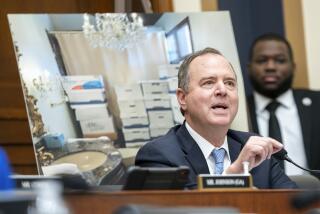Bare-knuckle politics
At any time other than in the midst of a heated electoral battle, it’s hard to imagine that Nancy Pelosi would attract much controversy by opining that the Democratic Party’s nominee for president should be the candidate who wins the most votes. The House speaker has done just that, last week drawing an angry backlash from wealthy supporters of Hillary Rodham Clinton.
Most Americans -- presumably including the 26 million who have participated with unprecedented enthusiasm in the Democratic primaries and caucuses -- still view this country as a representative democracy. Take a look at history, though, and the power of the popular vote in determining the next occupant of the White House starts to look a lot less absolute.
The last time the Democrats had a truly competitive fight on their hands, in 1968, the man who eventually won the nomination, Hubert H. Humphrey, garnered just 2.2% of the popular vote in the primaries. He relied instead on the 37 states that still allocated their nominating delegates by backroom fiat instead of the ballot box -- a strategy that may well have clinched his nomination even if Bobby Kennedy had not been assassinated.
The lack of serious intraparty competition in the intervening 40 years -- despite the central role now accorded to primary/caucus voting -- has been largely the result of a playing field tilted to favor establishment candidates such as Walter Mondale in 1984 and Al Gore in 2000. Iowa and New Hampshire -- both predominantly white, conservative states averse to maverick candidates like Jesse Jackson or even Howard Dean -- set the tone. The pile-up of states on Super Tuesday, requiring lavish funding and a high public profile, usually knocks out what is left of the competition. And, as an insurance policy, the party leaves any really close races in the hands of non-elected superdelegates, the issue central to the Hillary Clinton-Barack Obama showdown now.
The will of the people has been even more compromised when it comes to general elections for the presidency. In fact, on every occasion in American history when the race for the White House has been close enough to be contested, the candidate with fewer votes has prevailed.
It happened in 1800 -- admittedly, an age before mass suffrage rights -- when Thomas Jefferson managed to tie Aaron Burr in the electoral college. Jefferson eventually won the election in the House of Representatives, thanks to the distorting effect of the “federal ratio” -- the rule that gave Southern slave owners an additional 3/5ths vote for each adult they enslaved.
It happened in 1824, when the House threw the race to John Quincy Adams even though Andrew Jackson won more votes and more electoral college delegates. It happened in 1876, when carpetbagger Republican administrations in Louisiana, Florida and South Carolina refused to recognize the victory of the Democrat Samuel Tilden and essentially threw the election to his Republican rival, Rutherford B. Hayes.
And, of course, it happened in 2000, when the two major parties, the authorities in Florida and the Supreme Court all, in their own ways, prevented a full recount of the votes in the Sunshine State. And thus the keys to the White House went to George W. Bush, the candidate lagging half a million votes behind in the national vote tally.
Given this long history of dogged, dirty, win-at-any-cost electioneering, Clinton’s determination to keep fighting in the face of seemingly insurmountable electoral arithmetic makes a lot more sense.
When her surrogates argue that carrying big states such as California and Ohio is more important than being ahead in the overall popular vote, or when they argue that pledged delegates are not really pledged at all, they are following a well-worn playbook compiled by both parties down through the years -- which is to say and do anything that might push your candidate ahead.
In the end, the key to winning is not the number of votes but the efficacy of a candidate’s political campaign. If the Clinton camp can create the perception that voters from the early primaries are now suffering buyers’ remorse, and that the party’s grass-roots supporters want her after all, she still has a chance. Conversely, if she comes off as a sore loser willing to risk her party’s chances in November to further her personal ambition -- a perception already dragging down her approval ratings -- her gambit will most likely fail.
It shouldn’t be this way, of course. Democracy should be about the will of the people, pure and simple, as Pelosi has pointed out.
American politicians are generally very good at the rhetoric of deferring to that popular will. When their careers and their futures are on the line, however, it’s a whole different story, and always has been.
Andrew Gumbel is the Los Angeles correspondent of the Independent of London and the author of “Steal This Vote: Dirty Elections and the Rotten History of Democracy in America.”
More to Read
Start your day right
Sign up for Essential California for news, features and recommendations from the L.A. Times and beyond in your inbox six days a week.
You may occasionally receive promotional content from the Los Angeles Times.






